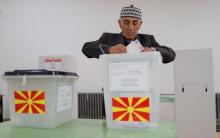VMRO-DPMNE party
MFA of North Macedonia: The Prespa Agreement Allows the use of the Term “Macedonia”
Hours after North Macedonia and Christian Mickoski appeared to violate the Prespa Agreement at the NATO summit, the foreign minister of the neighboring country readdressed the issue, arguing that the use of the term “Macedonia” is permissible.
North Macedonia's PM Wants Balkan Unity Over Insults and Provocations From Bulgaria and Greece
North Macedonia's Prime Minister and VMRO-DPMNE party leader Hristijan Mickoski addressed recent comments from Greek Prime Minister Kyriakos Mitsotakis and Bulgarian President Rumen Radev. Mitskoski highlighted his resilience against insults and provocations, asserting that he often emerges victorious in such situations.
North Macedonia’s parliament prepares to vote on a proposed center-right government
North Macedonia's parliament began a two-day debate leading up to a vote on the new government proposed by a center-right party that won May's national elections.
Next North Macedonia PM refers to country as ‘Macedonia’ in parliament
North Macedonia's prime minister-in-waiting has referred to his county as "Macedonia" three times at the start of a two-day parliamentary debate leading up to a vote on his new government.
Hristijan Mickoski, a 46-year-old former engineering professor, has pledged to continue his center-left predecessors' efforts to shepherd the small Balkan NATO member into the European Union.
Will North Macedonia become Orban’s Balkan gateway?
All diplomatic eyes in Athens will be on North Macedonia this weekend, as Parliament votes on approving the government announced by the leader of the nationalist VMRO-DPMNE party and winner of last month's parliamentary elections, Hristijan Mickoski.
Can the Prespa accord be changed or annulled?
On the day the Prespa Agreement signed between Greece and North Macedonia was ratified by the Greek Parliament, the then leader of the main opposition and current Prime Minister Kyriakos Mitsotakis, assailing ing its text, had declared on the floor of the Parliament: "So, if the Prespa Agreement is ratified, it will not be possible to annul it the next day, as it supersedes any law.
- Read more about Can the Prespa accord be changed or annulled?
- Log in to post comments
Mickoski doing his sponsors’ bidding
Incendiary statements by Hristijan Mickoski, the winner of North Macedonia's May 8 parliamentary election, have dispelled the illusion that his VMRO-DPMNE party, the core of the triumphant center-right coalition, is a modern European center-right party and not the nationalist populist formation led by his predecessor, Nikola Gruevski.
- Read more about Mickoski doing his sponsors’ bidding
- Log in to post comments
North Macedonia elects first woman president as center-left incumbents suffer historic losses
North Macedonia elected its first woman president Wednesday as the governing Social Democrats suffered historic losses in twin presidential and parliamentary elections.
A Greek agenda for the Balkans
The situation in the Western Balkans is (once again) cause for concern. In Kosovo, tensions between the ethnic-Albanian majority and ethnic Serbs are a near-daily occurrence, while in North Macedonia, the nationalist VMRO-DPMNE party is expected to win in presidential and parliamentary elections.
- Read more about A Greek agenda for the Balkans
- Log in to post comments
North Macedonia votes in elections crucial for EU accession
Polls opened in North Macedonia on Wednesday in parliamentary and presidential elections in which the rightist opposition is expected to gain ground against a ruling party that has failed to progress talks to join the EU and stamp out corruption.









